Archives: Articles/Practices
News . Events Environmental education – monitoring of protected natural areas in Prahova County
Care: Students were involved, interested or concerned about monitoring the state of forests Protected Natural Area – Plopeni Forest and Glodeasa Forest, a real-life problem, the vegetation state of the forest, the age of trees, the diameter of trees, their height. Students who participated in the activities were 17-19 years old, eleventh and twelfth grades, forestry and natural sciences.
Know: Students used knowledge about forestry, environment, ecology. The competences that students practiced were the ability to use measuring instruments, to correctly determine diameters, tree heights and appreciation of their ages, students’ questions were related to the composition of the forest and the presence of dead wood fallen to the ground that has not been extracted, maintenance of forest roads, information and clarifications that were presented and explained by both guiding teachers and partner representatives, all of which can be found in individual student portfolios.
Do: At the end, students prepared posters, campaign, infographic, video, interviews. They made PPT presentations, portfolios and were supported by families and representatives of the above-mentioned partners, former students of the college.
Findings related to the Open Schooling approach: The activity was framed in C.D.L., in the curriculum. It was useful, relevant, challenging, innovative, interesting and appealing, as evidenced by the attached photos. Open schooling could be useful for other teachers because it has an inter and transdisciplinary character – practical applications, worksheets from the work for obtaining the first didactic degree of Professor Ifrimu Iulia – Apprendre et developper le lexique du domaine forestier: approches didactiques en classe de FLE.
Results obtained by students: Students were curious, pleasantly impressed, attracted by field trips, whose memory created confidence that they will become students of forestry and biology faculties in the future. As an example, one student mentioned: “it is much easier to determine the height of trees with state-of-the-art devices – vertices than with old dendrometers in the school’s equipment” which is relevant and related to their achievements.
News . Events Involvement saves the planet
Care: Students were interested in learning about the negative environmental effects of plastic waste currently choking the planet, plastics disposal scenarios, and the advantages of using bioplastics over conventional plastics. Students who participated in the activities are aged 17-18, twelfth grade, 26 in number, basic field: natural resources and environmental protection.
Know: Based on the knowledge gained and by solving the tasks in the worksheets presented in the project, students developed skills of analysis and awareness of the negative effects of plastic on the environment and offered the opportunity to propose ways to reduce pollution with this type of waste.
Do: In the end, students made informative leaflets about the negative effects of plastics, drawings and models about the need to reduce plastic use, thematic articles in the school magazine. Family members were also involved in the activities, together carrying out activities to reduce pollution and raise awareness of the transition from linear plastic consumption to circular consumption.
Findings related to the Open Schooling approach: The activity is framed in the curriculum, within the environmental protection module, according to the qualification of the class that participated in the project. It was a challenging activity, which managed to actively involve students, families and members of the local community in collecting a large amount of plastics at school level, and from its capitalization was purchased planting material for the green space of the school. Open schooling could be challenging for other teachers as it provides opportunities to raise awareness of the need to reduce plastic use and build an environmental awareness that it passes on to students.
Student results: Students were actively involved and challenged in obtaining bioplastics from corn starch, acetic acid and glycerine and in selectively collecting a large amount of plastic mass. As an example, one student mentioned, “If we all use so much plastic and don’t stop, then we’re going to suffocate the Earth as fast as possible.”
News . Events Actions to reduce the carbon footprint
Care: Students were interested in finding out new information about pollution, they actively participated in the lessons on Carbon neutral proposed by the CONNECT project, a real-life problem “carbon footprint” was highlighted, each student made their own calculation and realized the importance of reducing it. The students who participated in the activities were in the eleventh grade the branch: technological, profile: technical, basic field: natural resources and environmental protection, qualification: ecological technician and environmental quality protection, 18 in number.
Know: Students used knowledge about environmental pollution through combustion reactions, identified where carbon dioxide emissions come from, from different activities: transport, energy production, agriculture and different industries. The competences that students practiced were: identified problems, applied knowledge about Earth’s atmosphere and global warming, developed teamwork skills, played the role of journalist, politician, architect or construction engineer, developed calculation skills, considered different perspectives for reducing carbon dioxide emissions and proposed solutions through the role they played, have developed skills to consider the economic and social consequences of environmental pollution.
Do: At the end, the students prepared different materials: posters, drawing – green house, report made by the journalist, article proposed by the researcher (scientist), article proposed by the politician regarding laws that will be applied to reduce pollution. They carried out the activities in groups of 3 to 4 and were supported by families.
Findings related to the Open Schooling approach: The activity is framed in the curriculum to the qualification of the class that participated in the project.
It was very useful, the lessons were held during the green school week, students received rich and useful information through this project, they were also put in the situation to look for information and propose solutions to reduce the carbon footprint, to be involved and useful to society.
Open schooling could be useful and challenging for other teachers because each of us carries a carbon footprint and we need to act to reduce it. The teacher must be a positive role model for the students.
The results obtained by the students: Students were happily involved in activities, developed different skills, confidence in science, sought solutions to problems related to environmental pollution with carbon dioxide, provided positive feedback at the end of the activities. As an example, one student mentioned the following conclusion: “the carbon neutral approach is essential in combating climate change, it is important to recognize examples that demonstrate genuine commitment and concrete actions in reducing greenhouse gases.”
News . Events STOP – FOOD WASTE!
Care: The students were interested in a real-life issue related to responsible food consumption that represents a conscious food choice, taking into account aspects related to our decisions regarding health, environment, economy, culture, etc. Carrying out social responsibility activities plays an important role in how participants will understand why making any decision about personal food can have negative consequences / irreversible on an important part of our planet. . The students who participated in the activities were students aged 3-18, from preschool, primary, secondary and high school. A total of 825 students participated in these activities.
Know: Students used knowledge about food waste by watching documentaries on the effects of food waste, conducting a case study at economic agents in the city – 3 restaurants, by visiting the bread factory in the city, making leaflets with information through which we can reduce food waste, making a trophic pyramid, healthy breakfast and making figurines of fruits and vegetables, drawing up posters.
The competences that the students practiced were:
- Motivating students to adopt a balanced and economical lifestyle;
- Encouraging students to find practical and effective ways to reduce food waste;
- Developing interdisciplinary connections to draw public attention to food waste;
- Changing the attitude of students, their families, school teachers towards food waste.
Do: At the end, students prepared posters, leaflets, posters, interview, video. They carried out the activities in groups but also individually, being supported by family and community members.
Findings related to the Open Schooling approach: The activity was framed in the curriculum. It was challenging and useful because students’ confidence and self-esteem increased as a result of participating in complex activities that highlighted their abilities and required them to make decisions. The improvement of social skills was reflected through cooperation at the level of working groups and students’ roles in this context, through the relationship with colleagues in school. Open schooling could be challenging for other teachers because it increases creativity levels among both teachers and students.
Results obtained by students: Students were interested in the topic proposed for research and showed interest in participating in other activities aimed at the practical and applicative character of the given topic
News . Events Let’s get active for mental health
Care Stage: Students did introductory activities on mental health. A total of 75 students participated.
Know stage: During participatory research in which they detected their needs and designed an action plan with various activities. They put mental health knowledge into practice and expanded it.
Stage Do: The activities were designed to be carried out the next course, we lacked time to do this stage.
Results related to the Open Schooling approach: Undoubtedly, participatory research has allowed them to treballar competències i sabers inclosos en el currículum de 3r d’ESO, però també d’altres que no hi estan directament especificades.
Support for the implementation of educational resources by: the department and the Living Lab of IrsiCaixa
Student results: The students were able to integrate certain knowledge and skills. Still, if we had given more time to conduct participatory research, the results would have been more satisfying. The students actively participate in the dynamics proposed to them.
News . Events In the CFGM of Pharmacy we promote our mental health
Care Stage: The students of the CFGM of Pharmacy made an analysis about health and its three branches and were very interested in working on the promotion of their mental health during their stay at the educational center. A total of 38 students participated in two groups (morning and afternoon).
Know stage: During the participatory research phase, during which they identified their needs and devised an action plan, students utilized their knowledge of mental health and habits. Additionally, they actively applied skills such as planning, organization, information retrieval, self-directed learning, and the application of acquired knowledge.
Do stage: Students conceived and implemented a mental health promotion action plan comprising four distinct activities. It was the students themselves who lead the sessions at the classroom.
Results related to the Open Schooling approach: Undoubtedly, participatory research has allowed them to not only develop the professional, personal, and social skills outlined in the curriculum of the CFGM Pharmacy and Parapharmacy but also provided them with the opportunity to enhance key cross-cutting skills essential for their future profession, such as autonomy, work organization, responsibility, and teamwork. Certainly, the inclusion of social actors in this research can further facilitate the cultivation and acquisition of these competencies and knowledge.
Support for the implementation of educational resources by: head of department
Student results: The students enthusiastically embraced the proposal and eagerly accepted the challenge to participate. We believe that this initiative has served as an excellent opportunity to shed light on the significance of mental health issues among young people. Simultaneously, it has enabled us to foster certain skills among the students through the application of scientific methodology throughout the entire process.
News . Events Open Schooling for mental health promotion
Taking care of young people’s mental health is a necessity. Schools are a fundamental part of their lives, so we could promote their emotional well-being. This year, we have implemented Healthy Minds, an Open Schooling project within the framework of the European project CONNECT, which aims to promote the mental health of students through a participatory research process. Another objective is to raise awareness that science and the scientific method can be useful in solving the challenges we face as a society and to abandon the idea “I’m not into science” that we often hear in the classrooms.
At the Caterina Albert High School in Barcelona, we have implemented Healthy Minds with a group of first-year baccalaureate students in the context of the subject of Scientific Challenges. During 2 sessions, we have conducted an analysis of the group members’ needs regarding mental health and prioritized them through a consultation process. We have designed and implemented an action plan based on various activities that address the prioritized needs, and we have evaluated the process and the learnings acquired regarding mental health and everything related to participatory research methodology. During the process, we had planned to involve families, but motivating them to participate has been a challenging task.
The results of implementing Healthy Minds in our school are still in a very early phase, although they reflect an increased awareness among students about the importance of promoting mental health. They have begun to integrate participatory research as a process to solve problems that affect them in collaboration with other stakeholders, and they have designed an action plan for the promotion of mental health. The activities that have been carried out are few, and we will evaluate how to implement it further in the coming school year by involving more stakeholders and incorporating it into the Educational Project of the school.
News . Events SUSTAINABILITY – Citizenship and partnership for a better city
“CARE” Phase: Students brought up themes such as combating COVID; recycling; conservation of city gardens; care for local squares, and the most popular topic was the Lago de Olarias, a public park recently inaugurated in the city, which has brought much development to the lake area. It is a project still in development and has caught the children’s attention for the care and development of the city. Real-life problems were discussed in groups, where students could contribute ideas and knowledge they brought from home, through the discussions they had with their families. They contributed historical facts, family memories, and many different knowledges. This caught the attention of students who brought other subjects. The fact that the lake is a new place in the city and is still in development, drew even more attention from the students. They were interested in understanding how they could contribute to the care of the place. The students who participated in the activities were from 3rd, 4th, and 5th grades of the early years of Elementary Education. Approximately 230 students.
“KNOW” Phase: Students used their knowledge about pollution, watersheds, groundwater, riparian forests, relief, sustainability, recycling, citizenship, among others. The most interesting stages were the initial discussion; preparing questions for the specialists and for a lecture with the former mayor who inaugurated the place; visiting the site and developing hypotheses to solve the problem of stream pollution.
“DO” Phase: In the end, students prepared a community awareness campaign about the source of the waters feeding the city’s main lake. They developed pamphlets and videos with messages of care and social responsibility. The activities were completed in groups and supported by the school and social community, such as local volunteers, politicians, among others.
Findings related to the Open Schooling approach: The activity used the open scenario method, conducted according to the responses that came from the participants. The curriculum was relevant and engaging, and teachers felt challenged, as they needed to acquire knowledge as doubts and questions arose. Open schooling can be very useful for other teachers because it expands the school curriculum, brings lightness and reality to the presented content, brings information and support for the continuous training of teachers, and makes 21st Century Education happen in the classroom.
Students’ outcomes: The students’ results showed involvement and interest throughout the project, including proposing new problems and developing projects that will become annual projects in our school environment. Talking about pollution and water distribution brought an interest in energy consumption, renewable and non-renewable sources, and a general sense of responsibility for the school community. For example, one student mentioned, “how good it is to be in a school that cares and helps us make a difference in our local community.”
News . Events Booklet on CONNECT’s open-ended scenarios
News . Events Mapping my school
Care: Students were interested to find out if their school can be accessible in other persons with disabilities, a real-life problem that occurs due to the old building where the school is located. Students who participated in the activities were 24 boys and girls of age 13-14.
Know: Students used knowledge about maps (general and thematic). The skills that students practiced were to create specific questions about the access in the building, to analyze the data, to create maps with the arcgis software, to discuss their findings and to write the conclusions of their study.
Do: At the end, students were worked in small groups of 3 or 4 persons, prepared maps, create a story map, participated in a Greek Contest “Χαρτογραφώντας την προσβασιμότητα” and present their findings in the Greek Students Conference of the Connect project. They supported by their families and the local community of the school.
Findings related to Open Schooling approach: The activity fitted in the curriculum. It was useful for our class of geography because students create their own maps. It was also innovative due to the real problem of the access in the bulding of school . Open schooling might be helpful for other teachers because students learn by doing themselves.
Change/innovation supported by: [ x ] schoolhead [ ] school association/network [ ] local government
[ ] Other: _________________________________________
Students’ Outcomes: Students were create maps and a story map that includes all their work. A group of students participated in the Greek Student Conference for the Connect project and they feel confidence about the project. As an example, a students mentioned ” I enjoyed so much to participate in the Greek Students Conference!”, “ I like to create my own map, I can learn by myself what are the important elements of a map.”
This practice contributed to increasing:
[ x ] families’ engagement in science [ ] girls’ participation in science. [ ] students’ science careers awareness
Please justify: The school faces real problem as concerns the access for persons with disabilities. Students discussed with their families what they can do and what are the solutions in order to reduce this phenomenon.
News . Events Investigation of potential sources of pollution on Lefkada by students of the 2nd Experimental Lyceum
Care: Students were interested in and investigated the special characteristics of the island through the online collection of data on the natural & technical environment of Lefkada’s island. The pollution of the natural environment, especially the coastal shores is a real-life problem where in many cases, the natural environment can be turned into an unjustified receiver of pollutants by local and tourist activities. This could negatively affect the island’s natural environment in the future. The students who participated in the activities were twenty-one (21), male and female students of the A and B Grades of the 2nd Experimental Lyceum of Lefkada, aged 16-17.
Know: Students used knowledge about of Natural Sciences such as Biology, Chemistry, and Physics. Biology was used as a basis for understanding ecology and ecotoxicology. The skills that the students practiced were multiple such as:
- Investigative method (inquiry-based learning) with question definition, research design, research conduct, results, resulting in the strengthening of students’ scientific thinking.
- Application of scientific methodology and utilization of environmental science elements.
- Cooperation with the scientific and local organizations of the island related to the environment.
- Collaboration with universities and research institutions for information exchange.
- Use of ICT (Information and Communication Technologies) to visualize the natural environment of Lefkada through the Google map and FILOTIS – Greek Nature Database, using the iNaturalistGR database.
- Investigation and presentation of the work plan (development of critical thinking, creativity, communication).
Do: At the end, the students prepared an electronic informational material which they posted on the school’s website. This was after a metacognitive evaluation of the data on Lefkada’s geophysical characteristics and the potential areas of pollution on the island. They also published an article in the school newspaper about the natural environment of the island. In the article, the students proposed ways to protect the environment, especially in the summer months when tourism increases. With the help of the Biology teacher in charge, the
students created a poster that refers to their actions in relation to the study of biodiversity and the study of potential pollution areas on the island of Lefkada. In addition, the students’ work was presented at the annual event of the Excellence and Creativity Clubs and activities of the current school year 2023, at the 2nd Experimental Lyceum of Leukada. The President of the Governing Committee of the Model Experimental Schools, Mr. Tombras, the mayor of the city, teachers, representatives of local agencies, and students of the school were invited to the event. They completed the activities as a group and were supported by their family, and their classmates by sharing good practices and ideas. The parents were especially supportive of the students as they helped them search and record reports on the pollution phenomenon, twenty years ago on the island.
Findings related to Open Schooling approach: The activity was fitted and adapted to the curriculum as it combined chapters from Natural Science courses including Biology, Physics and Chemistry. The activity is an innovation in education because through it students can use scientific data and elements to solve problems in their daily life, such as issues of ecological balance and environmental pollution (decision-making ability). The purpose of this activity is the cultivation of citizenship, where students, as tomorrow’s citizens and/or bioscientists, are called upon to make decisions about the environment, health, safety, and, in general, about any category of challenge that will arise from the applications of Biology/Ecology in our society. Open schooling might be both useful and challenging for teachers because it promotes students’ active participation by creating learning environments that will be governed by the principles of modern teaching methodology, such as inquiry learning and experiential and communicative approaches, encouraging critical thinking and creativity.
Change/innovation supported by: [X] schoolhead [X] school association/network [X] local government
[ ] Other:
Students’ Outcomes: The students initially showed a great interest in getting to know the natural and artificial environment of their island. In the Informatics laboratory, they watched a video showing the natural environment of Lefkada such as habitats, lagoons, and mountains combined with the human-made environment i.e. houses and tourist accommodations. The online Webex communication with the scinetist Dr.Vasilios Drosos, professor of the Department of Forestry and Environmental and Natural Resources Management of the Democritus University of Thrace, excited the students because they were given the opportunity to answer their key questions about pollution and the environment and to participate in a discussion as responsible and active members of an action. Students, as the most dynamic part of society, were receptive to learning during the seminar. This created a climate of mutual trust and interaction between the scientist and students. Furthermore, the students were excited about the use of google map, iNaturalist database and Filotis database for mapping and locating cities of Lefkada with a greater percentage of pollution with the use of software even though they were initially cautious. Some of the students mentioned “Is it possible that the software we find very easily on the internet can provide us with such a large amount of information?”, “Can we also map the other islands in the Ionian Sea?”.
This practice contributed to increasing:
[X] families’ engagement in science [X] girls’ participation in science. [X] students’ science careers awareness
Please justify: The contribution of the students’ families was decisive in the success of the activity. This is because they helped the students search and record reports on the phenomenon of pollution twenty years ago on the island and compare them with today’s data. The participation rate of female students in the total number of students who participated in the activity was expected to be 52.4% (11/21). A large percentage of students expressed an interest in the following professions related to the Schools of Health Sciences (Medicine, Biosciences, Nursing) and Positive Sciences (Physics, Chemistry).
News . Events UNESCO SDG3 Health through Augmented Reality
The central idea of the activity was to spark students’ curiosity by using news stories to connect science content to everyday life. The goal was for students to understand the relationship between the nervous system and the impact of psychoactive substances on the body, promoting greater interaction with their families and extending reflection beyond the classroom. Additionally, students were encouraged to engage with scientists to foster interest in pursuing STEM or science-related careers.
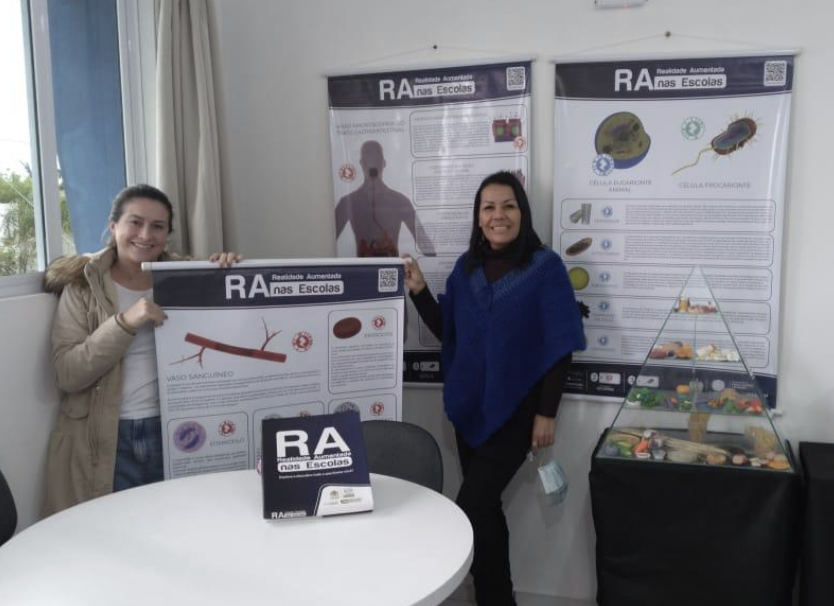
As part of the activities, teachers were given suggestions aligned with the National Common Curricular Base (BNCC), specifically for the 6th grade, within the thematic unit “Life and Evolution.” Among the suggested skills, students worked on explaining the functioning of the nervous system and how it can be affected by psychoactive substances (EF06CI10), as well as justifying the role of the nervous system in coordinating motor and sensory actions based on its structures (EF06CI07).
Throughout the project, teachers had the freedom to apply Augmented Reality (AR) cards as they saw fit, promoting a dynamic and tailored exploration of the content for the students.
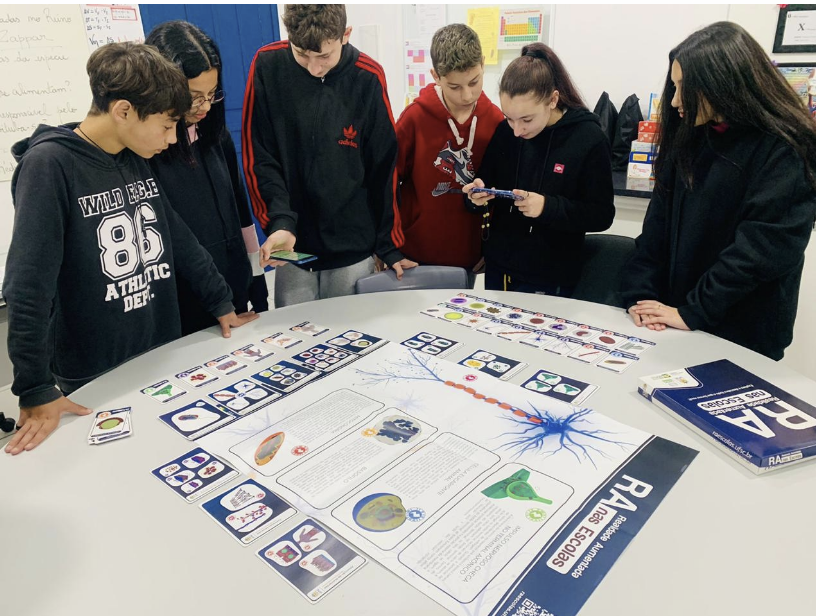
The students participated in a series of activities in three distinct phases, aiming to explore the functioning of the nervous system and the impact of psychoactive substances on the body using AR technologies and interactions with scientists.
– CARE: Students were encouraged to care about everyday issues raised by a news story related to the use of psychoactive substances. They explored how the nervous system can be affected by these substances using AR cards to visualize neurons, axons, and dendrites. This phase piqued students’ curiosity and motivated a deeper exploration of the content.
– KNOW: Students discussed the role of the nervous system in coordinating motor and sensory actions of the body. They also addressed how science can clarify the damage caused to the body by psychoactive substances and discussed the social impacts of substance consumption. The class listed the main problems related to the topic, broadening their understanding of the associated risks.
– DO: Students were encouraged to take the knowledge they acquired to their families. They were tasked with discussing the subject at home and bringing questions and curiosities to the scientists. Families also proposed actions to combat the problems identified in the previous phase, and students brought these ideas back to the classroom in the following session.
In the **Closing** phase, students watched a video with a guest scientist who answered their questions and explained how knowledge of the nervous system is related to their field of expertise. This brought students closer to scientific practice and stimulated their interest in scientific careers. After the video, students completed a questionnaire about the activities and the knowledge they had gained.
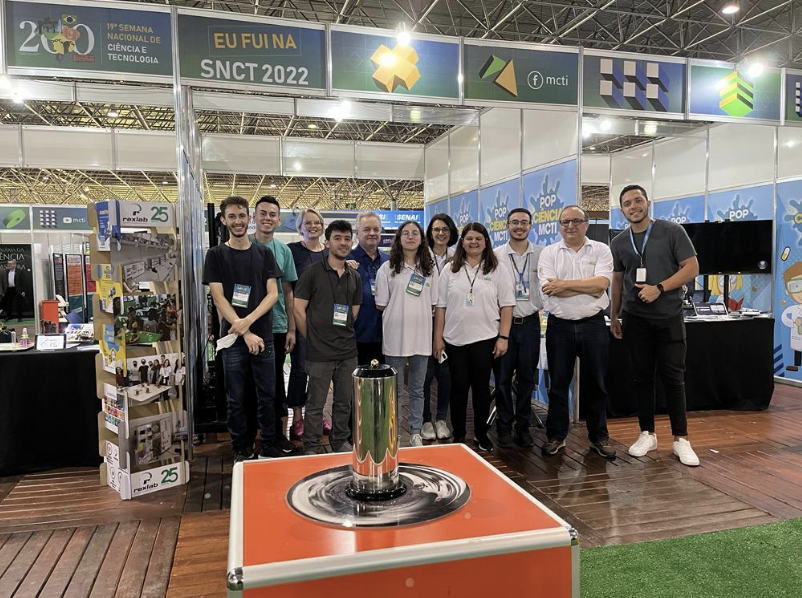
**Teaching Results**
The results showed varying levels of teacher confidence regarding the activities:
1. **Small Group Discussions (A08)**: 83% of teachers felt confident.
2. **Use of Questions for Divergent Thinking (A07)**: 76% of teachers felt confident.
3. **Interaction with Researchers and Scientists (A05)**: 71% of teachers felt confident.
4. **Encouraging Participation in Science Activities Outside School (A04)**: 71% of teachers felt confident.
5. **Promoting Discussions on Science and Society (A02) & Helping Generate Evidence-Based Questions (A03)**: Over 70% of teachers felt confident.
6. **Teaching Scientific Inquiry with Real-World Problems (A01)**: 65% of teachers felt confident.
7. **Encouraging Discussion of Scientific Topics with Family (A06)**: 66% of teachers felt confident, with 24% feeling less confident.
In all activities, only a small percentage (less than 5%) felt very unsure.
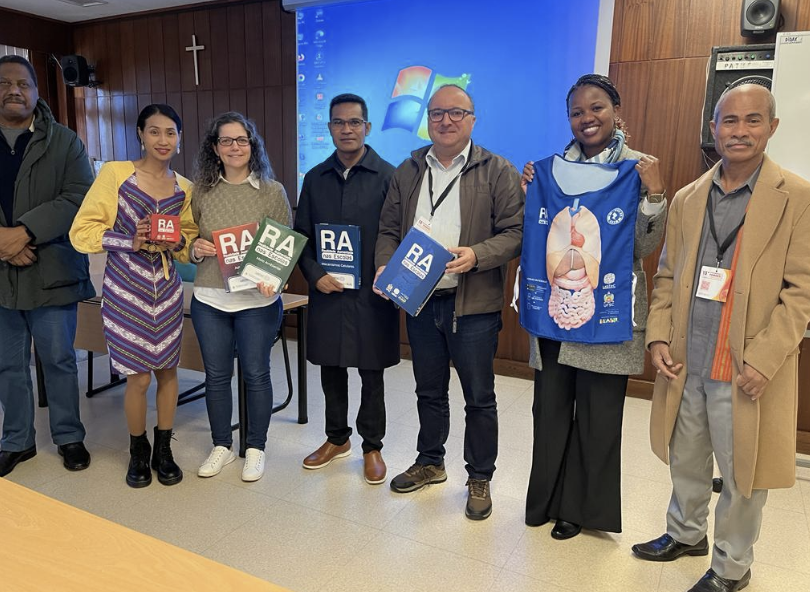
**Learning Outcomes**
Students generally demonstrate a positive attitude toward science and its importance. The vast majority (82%) agree or strongly agree that learning science will be useful in their daily lives. Even more (86%) recognize the importance of science, technology, and mathematics for problem-solving.
There is a strong belief (87%) among students that science helps people worldwide lead pleasant and healthy lives, indicating an understanding of science’s global impact.
However, when it comes to personal confidence in science, the results are more mixed. Only about a third of students (31%) feel confident in their science knowledge, with a similar proportion (31%) feeling confident using mathematics to solve scientific problems. Slightly more students (42%) feel confident using science to generate questions and ideas.
Students show more confidence in their ability to justify views using arguments and evidence, with 43% feeling confident in this area. This suggests that while they may not feel as confident in their scientific knowledge, they have developed some critical thinking skills.
Regarding practical application, nearly half of the students (48%) feel confident in doing science projects with colleagues, family, and scientists. A similar proportion (49%) feel confident talking about science, indicating a willingness to engage with scientific topics.
Encouragingly, the vast majority (80%) of students express interest in doing projects with others using science, suggesting a desire for collaborative, hands-on learning experiences in science.
When it comes to enjoyment and future aspirations, 57% of students find learning science fun. However, opinions are more divided on career prospects, with 42% interested in a job that uses science, and 37% aspiring to be seen as experts in science.
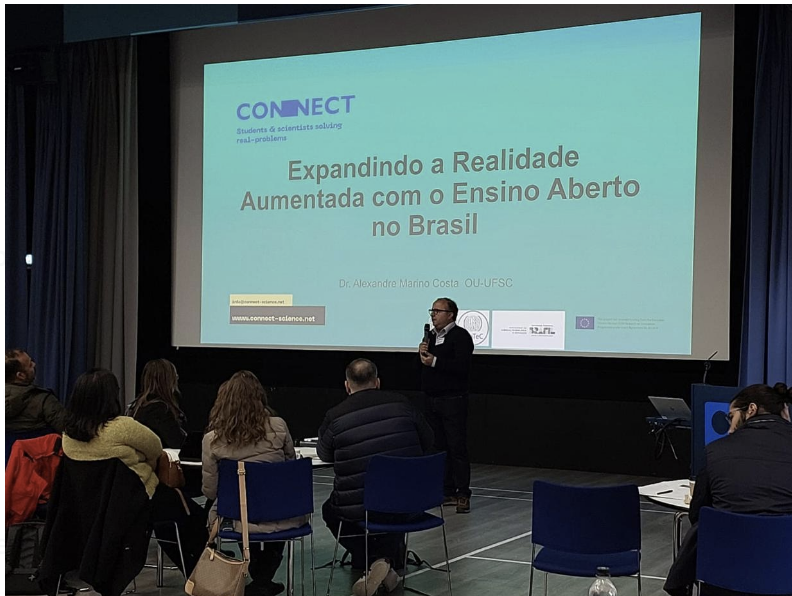
Overall, while students generally recognize the importance and value of science, there is room for improvement in building their confidence and skills in scientific practices. The data suggests that hands-on, collaborative approaches to science education might be particularly well-received by students.
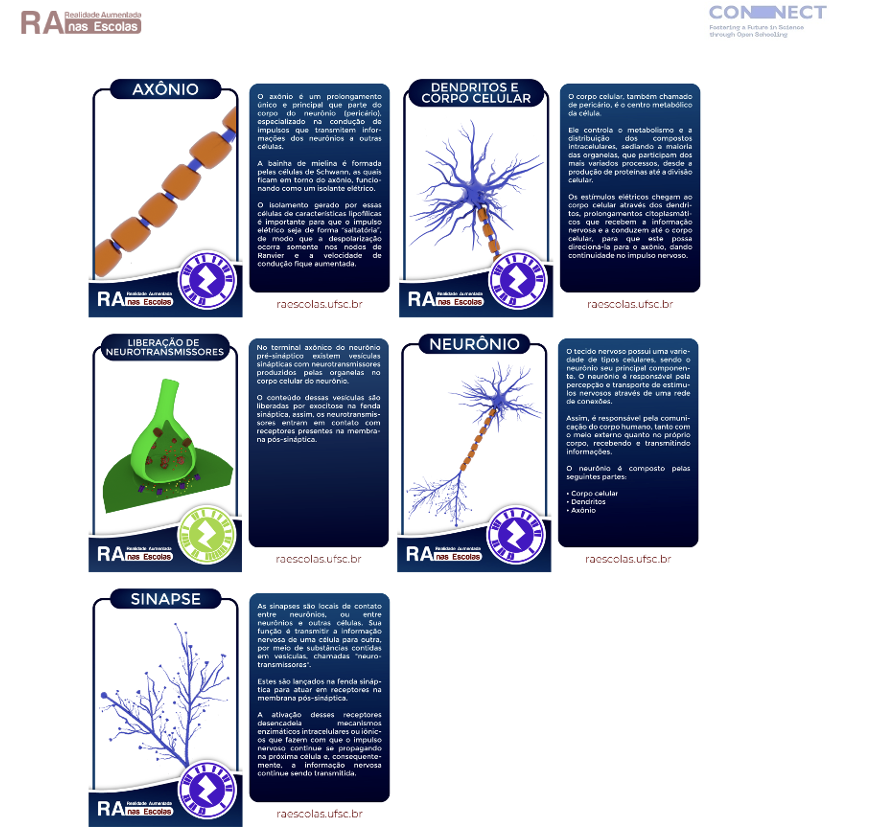
Links:
Results
[00:12, 04/10/2024] Students
[01:16, 04/10/2024] Teachers https://openeducation.eu.qualtrics.com/reports/public/b3BlbmVkdWNhdGlvbi02NDc3ZTY1M2IyYTU4MjAwMDhlYjZhODMtVVJfYnlMM3lKSFY0YlBxUkhE
News . Events SUNBORN
Care: Students were involved in designing and developing a video game that promoted the importance of digital skills for a real-life problem. The creators of the game aimed to raise children’s awareness about the usefulness of solar energy and solar panels. Students who participated in the activities were from all grades 9,10,11 and 12. The creators of the game were Hanc Ionuț Cristian – class 12 A and Bunea Nicolae – class 12 A.
Know: Students used knowledge about using green energy in planet exploration. The competences that the students practiced were: reasoned decision-making, teamwork on multidisciplinary topics, programming and implementation of software applications.
Do: At the end, the students prepared the video HERE, which they presented in school. They carried out the activities in teams and their families were involved in purchasing the necessary equipment for building the game and with technical consultancy for using free software for creating games.
Findings related to the Open Schooling approach: The activity can be included in the curriculum in science, geography, physics, chemistry, biology classes and less in computer science classes, because the computer science curriculum does not address the topic of creating video games. But it was very attractive to students who were curious about the secret of building a video game. Open schooling could be the future of education for other teachers because it would empathize with students, motivating them in creating and using video games as a method of creative and digital development.
The results obtained by the students: The student Hanc Ionuț Cristian, managed to get the first place, at the regional phase Made for Europe and to present the game in the UK and Greece within the project Eramsus+ – Games Jam, which had as theme the creation of video games. And because within the college we set up an excellent robotics group, which includes the creators of the game, following the visit of European Commissioner Ferreira, we were invited to the World Bank headquarters and the Ministry of Digitalization to present our projects. There I was able to talk to Ion, Mr. President’s AI assistant. We presented the project online at GUESS Indonesia and physically at the Science on Stage Festival!
News . Events Let’s get active for mental health
Care Stage: Students did introductory activities on mental health. A total of 75 students participated.
Know stage: During participatory research in which they detected their needs and designed an action plan with various activities. They put mental health knowledge into practice and expanded it.
Stage Do: The activities were designed to be carried out the next course, we lacked time to do this stage.
Results related to the Open Schooling approach: Undoubtedly, participatory research has allowed them to treballar competències i sabers inclosos en el currículum de 3r d’ESO, però també d’altres que no hi estan directament especificades.
Support for the implementation of educational resources by: the department and the Living Lab of IrsiCaixa
Student results: The students were able to integrate certain knowledge and skills. Still, if we had Given more time to conduct participatory research, the results Had It was more satisfying. The students go Actively participate in the dynamics proposed to them .
News . Events In the CFGM of Pharmacy we promote our mental health
Care Stage: The students of the CFGM of Pharmacy made an analysis about health and its three branches and were very interested in working on the promotion of their mental health during their stay at the educational center. A total of 38 students participated in two groups (morning and afternoon).
Know stage: During the participatory research phase, during which they identified their needs and devised an action plan, students utilized their knowledge of mental health and habits. Additionally, they actively applied skills such as planning, organization, information retrieval, self-directed learning, and the application of acquired knowledge.
Estapa Do: Students conceived and implemented a mental health promotion action plan comprising four distinct activities. It was the students themselves who lead the sessions at the classroom.
Results related to the Open Schooling approach: Undoubtedly, participatory research has allowed them to not only develop the professional, personal, and social skills outlined in the curriculum of the CFGM Pharmacy and Parapharmacy but also provided them with the opportunity to enhance key cross-cutting skills essential for their future profession, such as autonomy, work organization, responsibility, and teamwork. Certainly, the inclusion of social actors in this research can further facilitate the cultivation and acquisition of these competencies and knowledge.
Support for the implementation of educational resources by: head of department
Student results: The students enthusiastically embraced the proposal and eagerly accepted the challenge to participate. We believe that this initiative has served as an excellent opportunity to shed light on the significance of mental health issues among young people. Simultaneously, it has enabled us to foster certain skills among the students through the application of scientific methodology throughout the entire process.